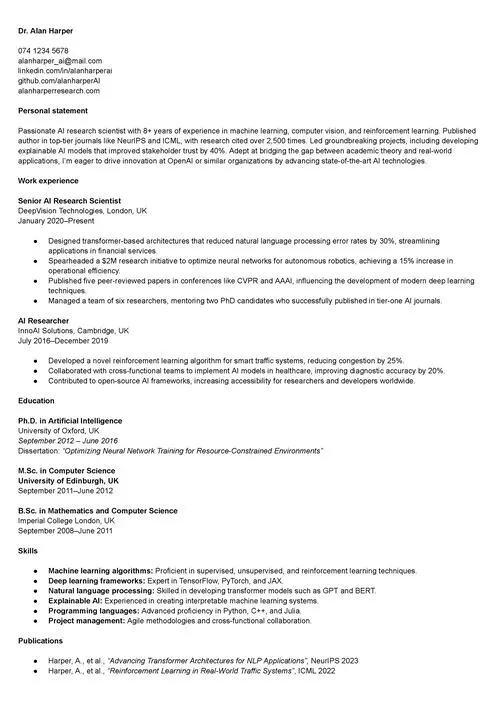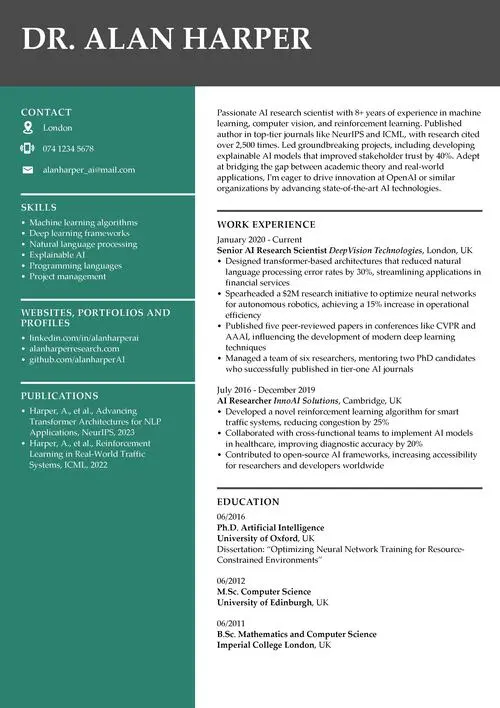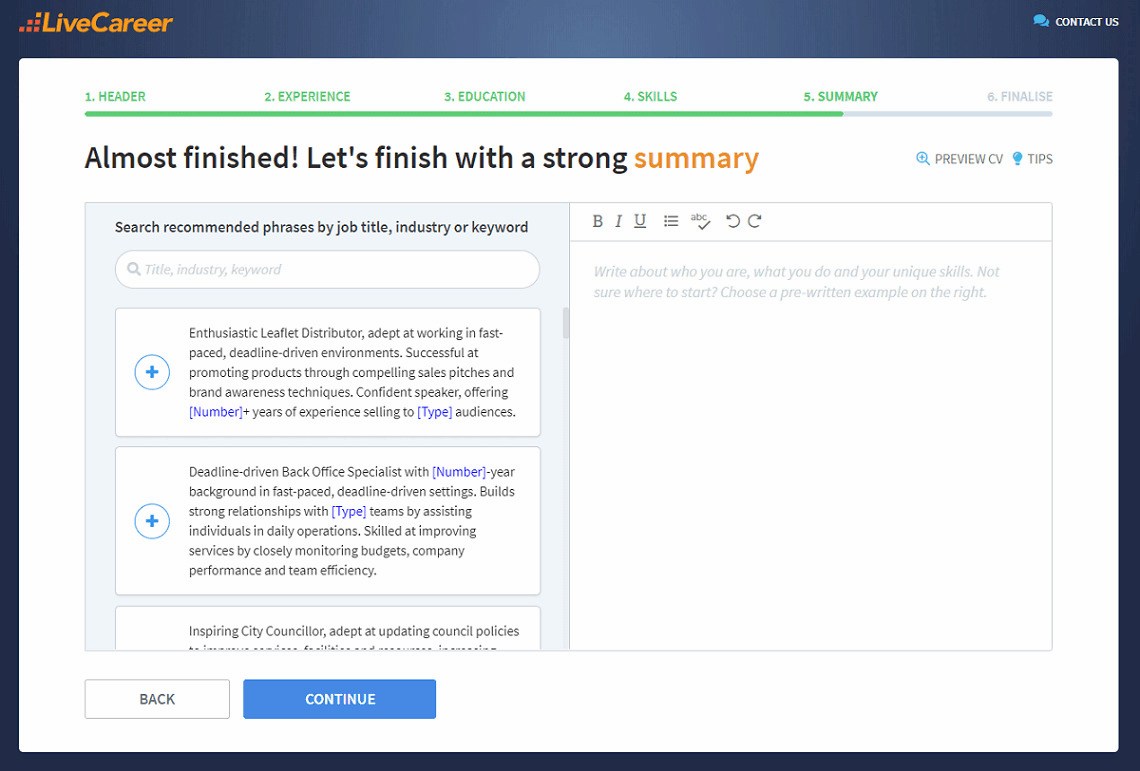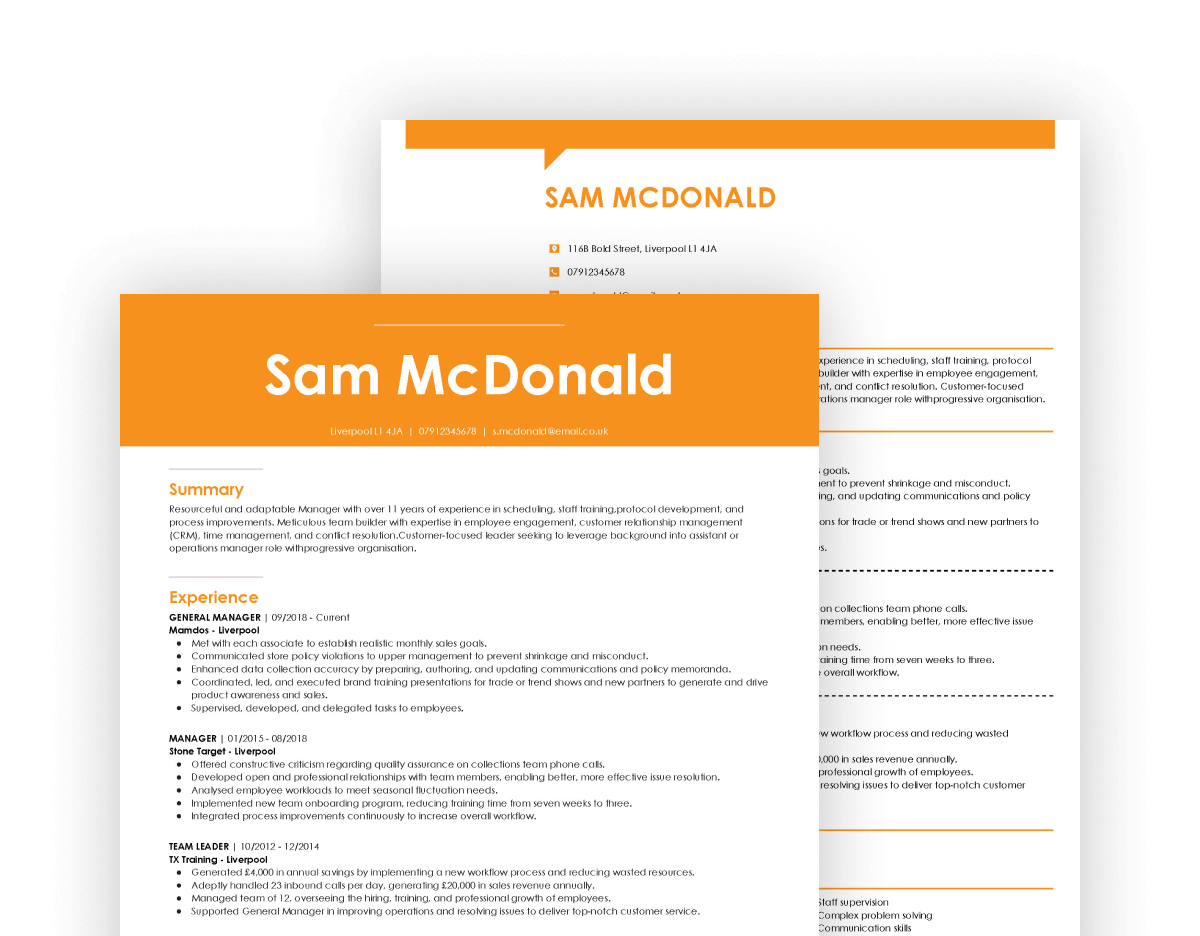Create a professional CV now!
 NO
NO YES
YESOur customers were hired by:
From language models to autonomous systems, the AI field is growing faster than ever. This means a wealth of opportunities for AI research scientists. But with competition at an all-time high, your CV must outperform others—it must show you possess the skills and attitudes no one else has.
In this guide, you’ll learn how to craft an outstanding AI research scientist CV. Whether you're applying to a leading tech company or a cutting-edge academic lab, we’ve got you covered.
Create an effective CV in minutes. Choose a professional CV template and fill in every section of your CV in a flash using ready-made content and expert tips.
Create a professional CV now!
 NO
NO YES
YESWe created the sample on the right using our builder. See other good CV examples like this one.
Need a different CV example? Check out these guides:
Haven’t found what you’ve been looking for? See all our CV examples.
Dr. Alan Harper
AI researcher
074 1234 5678
alanharper_ai@mail.com
linkedin.com/in/alanharperai
github.com/alanharperAI
alanharperresearch.com
Personal statement
Passionate AI research scientist with 8+ years of experience in machine learning, computer vision, and reinforcement learning. Published author in top-tier journals like NeurIPS and ICML, with research cited over 2,500 times. Led groundbreaking projects, including developing explainable AI models that improved stakeholder trust by 40%. Adept at bridging the gap between academic theory and real-world applications, I’m eager to drive innovation at OpenAI or similar organizations by advancing state-of-the-art AI technologies.
Work experience
Senior AI Research Scientist
DeepVision Technologies, London, UK
January 2020–Present
AI Researcher
InnoAI Solutions, Cambridge, UK
July 2016–December 2019
Education
Ph.D. in Artificial Intelligence
University of Oxford, UK
September 2012–June 2016
Dissertation: “Optimising Neural Network Training for Resource-Constrained Environments”
M.Sc. in Computer Science
University of Edinburgh, UK
September 2011–June 2012
B.Sc. in Mathematics and Computer Science
Imperial College London, UK
September 2008–June 2011
Skills
Publications
Projects
Certifications
Languages
Volunteering
Now you know what an exemplary AI research scientist’s CV looks like. Here’s how to create yours:
Your personal statement provides a concise space to summarise your professional background, highlight your most impactful work, and convey your career aspirations in a way that connects directly with the role. Focus on your most significant achievements, such as impactful research or innovative AI applications. Tailor your statement to the role, demonstrating how your expertise aligns with the organisation’s goals.
To make writing your AI researcher CV easier, ask yourself these questions:
In your CV summary, showcase your most significant professional experiences, technical expertise, and unique strengths that make you an exceptional AI research scientist. If you’re entering the field or applying for an entry-level position, emphasise your academic achievements, such as:
You can also highlight any contributions to AI development, such as creating innovative machine learning algorithms, presenting at recognised conferences, or publishing impactful research. All these mentions featured at the top will capture attention and increase your chances of being recognised as a strong candidate for your desired opportunity.
As an AI research scientist, your ability to analyse large datasets with precision is one of your key strengths. Apply this expertise to your CV by reviewing your responsibilities and, more importantly, your achievements. Identify and prioritise up to six standout accomplishments for each role you include, ensuring they showcase your most impactful contributions.
In your work experience section, follow a reverse-chronological format, starting with your most recent AI research scientist role and working backward through your career. For each position, include your job title, employer's name, and employment dates (use “present” if you are currently in the role).
Under each entry, use bullet points to detail your key responsibilities and accomplishments, emphasising measurable impacts and significant contributions. To make the entries more impactful, open each bullet with a powerful action verb—like “designed,” “spearheaded,” or “managed”—to create a strong impact. Focus on measurable achievements in your CV rather than just listing duties, and don’t simply describe what you did. Just demonstrate how well you did it. Structure your accomplishments using the PAR (Problem, Action, Result) method to outline your challenges, the steps to address them, and your successful outcomes.
Ensure this section of your CV for AI research jobs aligns closely with the job description for the position you’re applying for. Emphasise the specific skills and expertise the employer values, demonstrating how your background directly meets their requirements.
In AI research, your education is a major component of your expertise. This section should highlight the advanced degrees, theses, and coursework that align with the roles you’re targeting. Here’s how to structure your education section:
If you’re a recent graduate entering the field of AI research, begin by listing the name of your school, location, and years attended. For A-levels or equivalent qualifications, highlight subjects related to computing, mathematics, or technology, as these form the foundation of AI expertise.
If you have a university degree, include the institution's name, your degree title (e.g., Artificial Intelligence, Computer Science, or Mathematics), and years of attendance. If you’re currently pursuing a degree, include your expected graduation date. Additionally, list any relevant qualifications, such as certifications in programming languages, machine learning frameworks, or ethical AI development. Be sure to include the institution, certificate title, and duration of the course.
As a recent graduate with limited professional experience, position the education section at the top of your CV to emphasise your academic achievements, coursework, and research projects that directly relate to AI. This approach highlights your potential and technical foundation in the field while your professional experience is still growing.
A strong CV summary will convince the recruiter you’re the perfect candidate. Save time and choose a ready-made personal statement written by career experts and adjust it to your needs in the LiveCareer CV builder.

A well-rounded AI research scientist CV should balance technical prowess with soft skills like communication and strong teamwork abilities. In your skills section, include a mix of hard and soft skills, and whenever possible, provide a brief context for how you’ve used them.
Employers value candidates with a well-rounded profile. Additional sections can showcase your versatility and passion for the AI field. Just as you would fine-tune an AI model to achieve optimal results, enhance your CV by including additional sections that could be decisive in securing your desired career opportunity.
Consider these valuable additions:
A well-crafted cover letter provides an opportunity to elaborate on your CV, showcasing your enthusiasm for the role and the organisation in a personalised way.
Start with a compelling introduction that conveys your excitement about the opportunity and the company’s mission. Highlight a specific achievement that demonstrates your ability to drive innovation or solve complex AI problems, such as a breakthrough research project or a deployed AI solution. Relate this directly to the job requirements, illustrating how your expertise and experience align with the role.
End with a confident closing that invites further discussion, showing your eagerness to contribute to the organisation’s goals and vision in the AI field.
To make your CV stand out and effectively showcase your qualifications, consider these tailored recommendations for formatting and content:
And, that’s it! You now possess the insights needed to craft a compelling AI research scientist CV and truly stand out.
You don’t have to be a CV writing expert. In the LiveCareer CV builder you’ll find ready-made content for every industry and position, which you can then add with a single click.

Thanks for reading, I hope you liked this article. If you have any questions about writing an impressive AI research scientist CV, feel free to ask in the comments below. Good luck with your job search!
Our editorial team has reviewed this article for compliance with Livecareer’s editorial guidelines. It’s to ensure that our expert advice and recommendations are consistent across all our career guides and align with current CV and cover letter writing standards and trends. We’re trusted by over 10 million job seekers, supporting them on their way to finding their dream job. Each article is preceded by research and scrutiny to ensure our content responds to current market trends and demand.
About the author
Since 2013, the LiveCareer UK team has shared the best advice to help you advance your career. Experts from our UK editorial team have written more than one hundred guides on how to write the perfect CV or cover letter.
Rate this article:
Ai research scientist cv
Average:

The AI CV topic attracts you, but you’re unsure if it can help your CV? Check the pros and cons of using AI CV makers and decide more easily.
A decent CV ready in minutes and without effort? Sounds good, but is it even doable? Check which free AI CV maker can take some work off your hands.
Writing a CV and feeling stuck? Check the best AI CV makers that can take some burden off you. Consider using an AI CV maker and write your CV faster.
Our customers were hired by: